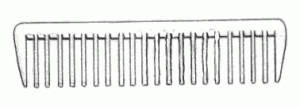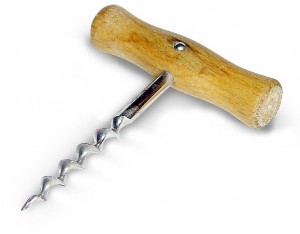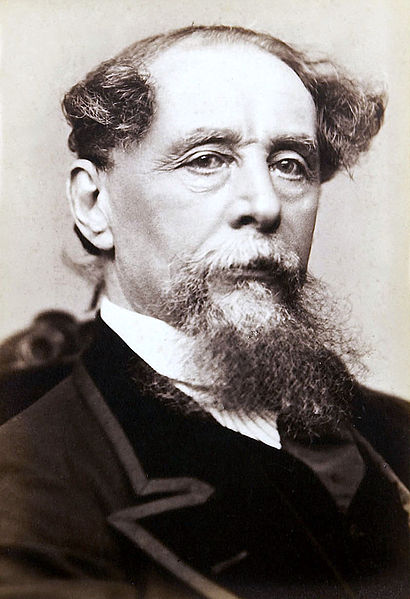The Louisville Commercial scored an interview with someone who did dictatorial duties for Charles Dickens. The resulting article was republished in the August 16, 1882 Brooklyn Daily Eagle. An excerpt:
“‘You were an amanuensis of Charles Dickens, were you not?’
‘Yes, I did shorthand work for Mr. Dickens for eighteen months. I did not take dictation for any of his novels, only his fugitive pieces. He dictated to me most of his articles in All the Year Round. He was a very clever gentleman to those under him. He always treated me very well, indeed. Most people seem to think Dickens was a ready writer. This is by no means the case. He used to come into his office in St. Catherine Street about eight o’clock in the morning and begin dictating. He would walk up and down the floor several times after dictating a sentence or a paragraph and ask me to read it. I would do so, and he would, in nine cases out of ten, order me to strike out certain words and insert others. He was generally tired out by eleven o’clock, and went down to his club on the Strand. A singular thing was that he never dictated the closing paragraphs of his story. He always finished it himself. I used to look in the paper for it, and find that he had changed it very greatly from what he had dictated to me.
 Dickens had a very odd habit of combing his hair. He would comb it a hundred times in a day. He seemed never to tire of it. The first thing he did on coming into the office was to comb his hair. I have seen him dictate a sentence or two, and then begin combing. When he got through he dictated another sentence. He was very careful about his writings. He wanted every sentence to be as perfect as possible before letting it go to press. Dickens was an odd fellow regarding the company he sought. I have known him, while I was employed by him, to go down to the Seven Dials, about the worst place in London, and sleep and eat there. He roasted his herring where the rest did, and slept with the poorest. He loved low society. He never seemed so happy as when seated in a poor coffee house, with a crowd of the lower classes talking around him. He never missed a word that was said, and was the closest observer I ever met. Nothing escaped him. Those most minute mannerisms were noted and stored away. When I was working for him he was at the zenith of his fame, just before his death; and even then he loved those careless, rollicking rounds among the poor better than a high toned dinner.
Dickens had a very odd habit of combing his hair. He would comb it a hundred times in a day. He seemed never to tire of it. The first thing he did on coming into the office was to comb his hair. I have seen him dictate a sentence or two, and then begin combing. When he got through he dictated another sentence. He was very careful about his writings. He wanted every sentence to be as perfect as possible before letting it go to press. Dickens was an odd fellow regarding the company he sought. I have known him, while I was employed by him, to go down to the Seven Dials, about the worst place in London, and sleep and eat there. He roasted his herring where the rest did, and slept with the poorest. He loved low society. He never seemed so happy as when seated in a poor coffee house, with a crowd of the lower classes talking around him. He never missed a word that was said, and was the closest observer I ever met. Nothing escaped him. Those most minute mannerisms were noted and stored away. When I was working for him he was at the zenith of his fame, just before his death; and even then he loved those careless, rollicking rounds among the poor better than a high toned dinner.
 ‘Was he a great drinker as he has the reputation of being?’
‘Was he a great drinker as he has the reputation of being?’
‘I never saw him drink myself. I have seen him several times, exhilarated, however. He only drank the best of wine, but he drank that very freely. Sherry was his special favorite, and he never refused a glass of fine old sherry. He was an insatiable cigarette smoker, and when dictating to me always had a cigarette in his mouth. He was a very spruce man, too. He brushed his coat frequently and changed his collars several times a day. He was every bit as humorous in his speech as in his writings. When he was in a very particularly fine humor he could keep you laughing by the hour with his witty talk. He was not one of those men who are above those they employ; he chatted as freely with me as any member of his club on the Strand. Dickens was undoubtedly the best after dinner speaker in England. I heard him at Whitehall once. There was an enormous crowd, hardly standing room, and he kept them in a continual roar. He was a fine actor, and this, added to his wit, made him irresistibly funny. He was a great eater; not an epicure, but a gourmand. He ate and ate and ate, and cared little for the quality so there was enough before him.”
Tags: Charles Dickens

